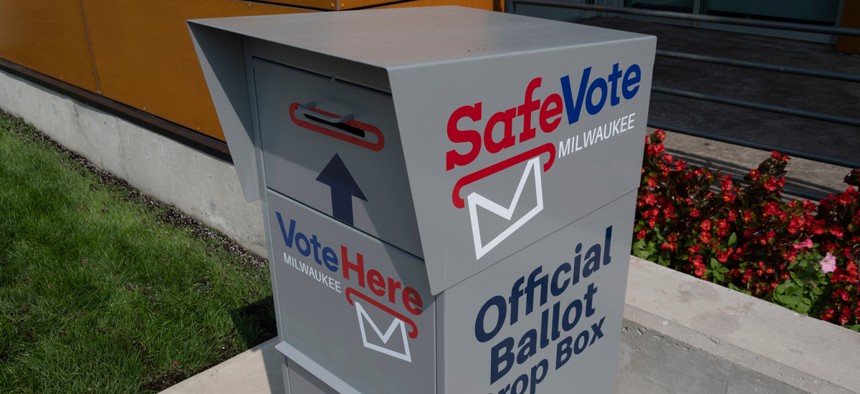Conservatives Are Challenging Private Grants to Help Local Officials Run Elections

A vote drop box in Milwaukee, Wisconsin. The city asked for grant funding to help purchase election equipment like drop boxes. Shutterstock
An initiative backed by Facebook’s Mark Zuckerberg is giving grants to local election offices that face funding shortages as a result of the pandemic. Conservative groups in several states have sued, saying the efforts are meant to boost the Democratic vote.
For months, local election officials have been sounding the alarm about November. Following chaotic primaries in which thousands of voters never received their absentee ballots, faced long lines if they chose to vote in person, and had to bang on the doors of closed polling places to be let in, officials in many states said they needed significantly higher budgets to ensure that every vote is counted in November.
But Congress has been unable to agree to another round of coronavirus relief funding, leading to private funders stepping in to fill some of the gap. Now, the grants local governments are seeking are coming under fire from conservative groups that launched lawsuits in several swing states, arguing that the money is being used to help elect Democrats.
In September, Facebook founder Mark Zuckerberg, along with his wife Priscilla Chan, announced a $250 million donation to the Center for Tech and Civic Life, a nonpartisan group that usually assists local election administrators with technical needs like building election websites, for them to regrant to local election offices. They also provided $50 million to the Center for Election Innvation and Research, which can be used by states and local governments to educate people on how to safely vote during the pandemic.
Zuckerberg and Chan noted that the Congress had only allocated $400 million for election administration in March, but much of it was sucked up by the primaries and the amount fell far short of the $4 billion that experts estimated would be needed for the 2020 election season.
Since the CTCL announced an open call for grant applications, over 1,100 election administrators from across the country have applied. The minimum amount disbursed is $5,000 and can be used to fund staffing, training, and equipment purchases. Most jurisdictions that applied for funding have less than 25,000 registered voters, with officials saying they needed money to buy equipment to help process mail-in ballots, hire temporary staff, and for polling place cleaning and hygiene measures like installing plexiglass shields around voting booths.
With grants now being distributed, conservative groups in four swing states—Michigan, Minnesota, Pennsylvania, and Wisconsin—are suing to prevent local election officials from using the money.
In Wisconsin this week, a conservative group known as the Wisconsin Voters Alliance filed a lawsuit in an attempt to block the cities of Racine, Milwaukee, Kenosha, Green Bay, and Madison from using a combined total of $6.3 million. The group argued that the cities were granted the money only because they have “high rates of progressive voters” and that the money constitutes an impermissible public-private partnership.
In their request for grant funding from CTCL, the five Wisconsin cities said they had already spent most of the money allocated to election administration for 2020 and needed more for ballot drop boxes, masks and gloves for poll workers, and high-speed ballot tabulators. Without the money, the cities said that they would have “no choice but to make tough decisions between health and the right to vote; between budget constraints and access to fundamental rights.”
Similar legal battles are playing out in other states. In Minnesota, a conservative group called the grants an “entanglement of public and private interests.” In Pennsylvania, Republican state legislators are part of a group that filed a lawsuit arguing that Philadelphia’s grant funding would be targeted “to turn out the vote in blue jurisdictions.” In Michigan, a lawsuit alleges that the grant money allows “the appearance of undue influence.”
The lawsuits are being coordinated by the Thomas More Society, a conservative legal group based in Chicago.
Local election officials in these four states, and in ones where no lawsuits have been filed over the funding, say that the money is not being used in a partisan way and is meant to encourage voter turnout from both sides of the aisle. In Minneapolis, City Attorney Jim Rowader said the city wants to use the money to improve voting access. “Our goal is to empower all voters regardless of their party affiliation,” he said.
The Center for Tech and Civic Life called the lawsuits “baseless” and said that “countless election officials, from across the political spectrum … simply don’t have the funding they need to provide a safe, secure voting process for their voters as a result of the COVID-19 pandemic.”
“As a non-partisan organization backed by Democrats, Republicans, and nonpartisan officials, we are confident that these frivolous charges are without merit, and look forward to continuing this critical grant program in these unprecedented times,” a statement from the group reads. “All eligible Americans deserve to have their vote count—regardless of political affiliation, whether they live in rural or urban communities, or somewhere in between.”
Emma Coleman is the assistant editor for Route Fifty.
NEXT STORY: NY, NJ launch COVID exposure apps






